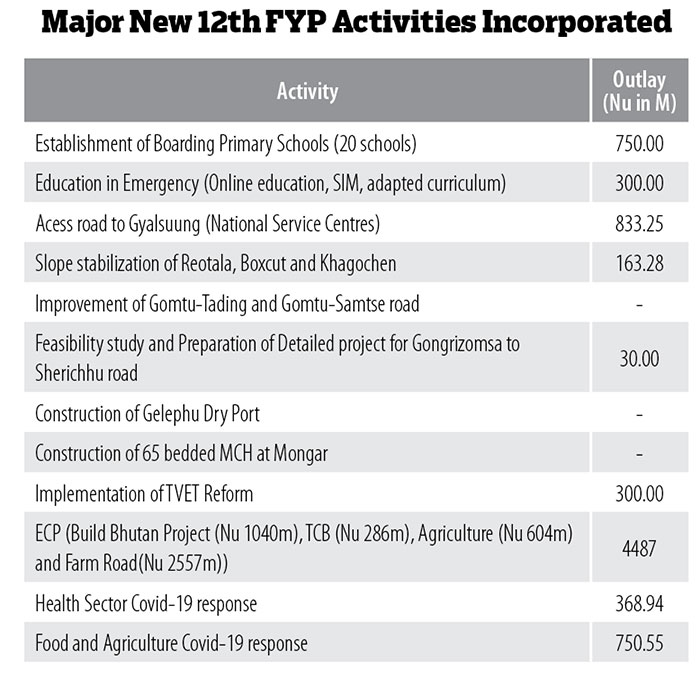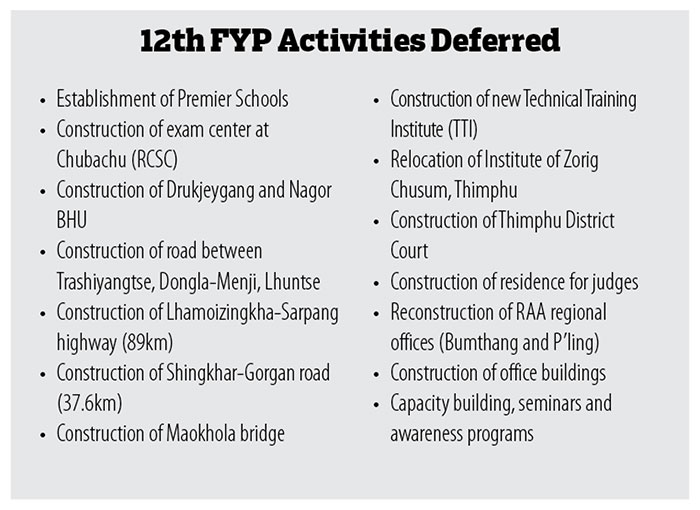JDWNRH to be multi-specialty hospital
MB Subba
Some of the government’s top priorities have taken the backseat as development activities and programmes had to be reprioratisatised in the wake of the Covid-19 pandemic.
The government for now has deferred 13 major capital budget activities, including construction of a new technical training institute and establishment of premier schools for science, technology, engineering and mathematics from the 12th Plan.
The primary reasons are the limited budget and the restriction on import of foreign workers. The government is already facing a fiscal deficit of Nu 14 billion (B) in the current fiscal year.
The future of the deferred projects remains uncertain while the activities that are incorporated in the 12th Plan are for immediate implementation.
Twelve new activities, including establishment of 20 boarding primary schools, construction of a dry port in Gelephu and the economic contingency plan (ECP) have been incorporated in the 12th Plan.


One of the plans that was supposed to be implemented this month was establishment of an embassy or a consulate office in Australia.
However, the plan has been postponed for next year on the advice of the Australian government, according to Foreign Minister Dr Tandi Dorji.
As per the 12th Plan, the government is also supposed to establish a resident embassy in Japan and a consulate in Dubai in the United Arab Emirates. When the implementation of the plans will take place has now become uncertain.
Gelephu’s Maukhola bridge, for which a total of Nu 400 million (M) was allocated, has been deferred from the 12th Plan priority. This means that the bridge will not be prioratised in the present government’s tenure.
Prime Minister and GNHC chairperson, Dr Lotay Tshering, said that all the priority projects, including the Maukhola bridge, were still active although they had taken a backseat for now.
However, he added that the sheer scale of the project not only entailed import of workers but also posed Covid-19 threats due to its proximity with neighbouring states of India.
The prime minister said that projects that required import of materials, skills and consultancy services in large scales would not be implemented in view of the Covid-19 situation.
He said that development partners, including the Government of India (GoI), Japan and the European Union, had expressed their commitments to provide what had been committed, if not more.
“Yes, some of the projects have taken the backseat as we have no choice,” the prime minister said. But he said that all the projects were still active and that they needed to be reviewed and re-strategised.
The government’s main concerns, he said, were the delay in works and the projected fall in the domestic revenue due to the Covid-19 pandemic. The finance ministry has projected the domestic revenue to fall by 14 percent in the fiscal year 2020-21, which is unprecedented.
Another plan that faces uncertainty due to Covid-19 is the electric train between Paro and Thimphu.
Earlier in February, the government had said that a project office would be set up under the Prime Minister’s Office to pursue the plan. The prime minister had announced the electric train plan in February.
The government has allocated a capital budget of more than Nu 36 billion (B) for the fiscal year 2020-21, which is 31 percent of the entire 12th Plan’s budget. He said that the government would have allocated only 24 percent of the 12th Plan budget had the situation been normal.
The 12th Plan has a total budget outlay of Nu 310B of which Nu 193B is the current budget, and Nu 116B is the capital budget.
The total budget for the current fiscal year is Nu 73,989M, out of which Nu 32,900M or 44 percent is for recurrent expenditure and Nu 36,251M or 49 percent is capital expenditure.
However, he added that the activities would be reviewed from time to time to align with the needs of the evolving situation. “The PMO, GNHC and the finance ministry will sit together every month,” he said.
JDWNRH to be multi-specialty hospital
The prime minister said that the government’s plan to build a multi-disciplinary hospital was also still active and that the JDWNRH would be re-modeled and converted into the main campus.
The earlier plan was to set up the multi-specialty in the education city project site at Wang Sisina, in Thimphu. The prime minister, however, said that it would not make sense to take the existing specialized facilities from JDWNRH to a new campus.
The strategy is to incorporate additional specialised services such as heart surgery, kidney transplant, infertility treatment and cancer treatment in the JDWNRH.
The GoI, according to the prime minister, has agreed to provide most of the estimated budget of the multi-disciplinary hospital.
Converting the JDWNRH into a multi-specialty will involve offloading the routine services to other nearby hospitals that are being upgraded. He said that a district hospital and an infectious disease hospital would be built in Taba and Gidagom respectively.

